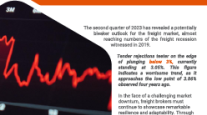U.S. Trucking to Surge Into 2013, But Experts Worry About Europe
This story appears in the Jan. 30 print edition of Transport Topics.
LAS VEGAS — Domestic trucking should continue to benefit from a decent economy this year and into 2013, and truck makers are looking at steady global economies — with the crucial exception of Europe, economists and analysts said here at a heavy-duty industry meeting.
The extent of Europe’s economic damage — and how far it will spread — was the greatest uncertainty discussed at Heavy-Duty Dialogue on Jan. 23. While no one mentioned a return to recession in the United States as being likely soon, they did list concerns including: unemployment at or above 8% because economic growth will stay below 3%; a gridlocked political system that probably will not fix federal finances; and peculiarities in manufacturing that allow it to generate large amounts of revenue and profits while employing ever fewer people.
“We’ll see growth of 2% to 2.5% in U.S. gross domestic product this year, about enough for unemployment to stay in a flat line. If you’re looking for it to go below 8%, it’s not going to happen,” said Jeffrey Rosensweig, a business professor at Emory University.
“The economy will grow in line with its recent trend, or a little better, and that means high unemployment will remain,” said William Strauss, senior economist for the Federal Reserve Bank of Chicago. Strauss also said there is still a lot of productive slack in the economy, meaning that inflation is not an imminent threat, and no one seems to know for sure when the long-battered construction industry will return to the vigor it once enjoyed.
The Dialogue conference is sponsored annually by the Heavy Duty Manufacturers Association.
Rosensweig, who specializes in international business, said the economies of France, Germany, Italy, Spain and the United Kingdom all will contract this year, but by less than 1%. He further predicted they would return to growth in 2013.
He said that, in retrospect, creating the euro as a continental currency was a bad idea, but it will probably endure, albeit in a lesser form, with “some countries, especially Greece, getting thrown out.”
The U.S. and the world’s other major economies all should continue to grow this year and next. In the long-term, Rosensweig said, the United States has more favorable demographic characteristics than do China, Russia and Japan, all of which soon will be top-heavy with older citizens and not enough working-age citizens to support them.
Despite those benefits, Rosen-sweig also found a number of reasons for serious concern. Trouble with the euro and other currencies means the dollar has been getting stronger recently, and that could hurt U.S. exports by making them more expensive. He also said the national debt is “massive, unprecedented” and probably “unsustainable.”
In addition, Rosensweig said it is distressing to see how slowly the employment picture is recovering and that this has hurt the elderly.
“At this rate, it will take eight years of growth to get back to the good old days before the recession,” Rosensweig said of the unemployment rate.
The recession also damaged the retirement plans of Americans aged 60 and older who are working longer than anticipated.
“401(k) plans became 201(k)s,” he quipped, referring to diminished savings.
Strauss offered a long-term survey of American manufacturing, which has recovered strongly after falling drastically during the recession. He said the nation specializes in high-value-added goods rather than typical consumer products.
Strauss said the notion that U.S. manufacturing is disappearing is a myth. The value of
American manufactured goods reached a historic peak just before the recession.
Despite the high output, manufacturing perhaps has suffered from too much of a good thing: increased productivity. The U.S. has built an increasingly valuable base of capital that allows fewer workers to make more goods.
What 1,000 workers made in 1950, Strauss said, was produced by 177 manufacturing employees in 2010. The prices of those products have been kept in check over time as well, Strauss said, because productivity has risen faster than many input costs.
The sector could employ more people, Strauss said, if it were less productive, but then prices would rise and the products would not be as competitive.
“I’ve testified before the Senate and told them not to focus on the labor issue. Look at the output instead,” Strauss said, but he acknowledged that message is unpopular during times of high unemployment.
He said manufacturing is becoming more like U.S. agriculture, a sector that produces vast amounts of food, including exports, but it does so with a very small employment base.
Dialogue did feature some growth in manufacturing em-ployment as Fras-le S.A., a Brazilian company that makes brake friction material, said it will invest $11 million to expand its plant in Prattville, Ala. The expansion is supposed to generate 100 new jobs by the end of 2013.
Fras-le is a supplier to Meritor Inc., a Troy, Mich., manufacturer of brakes, axles and safety systems for trucks. Fras-le currently makes disc brake pads in Prattville, at what used to be a Haldex Brakes plant. The company will be adding brake linings for trucks at Prattville.




